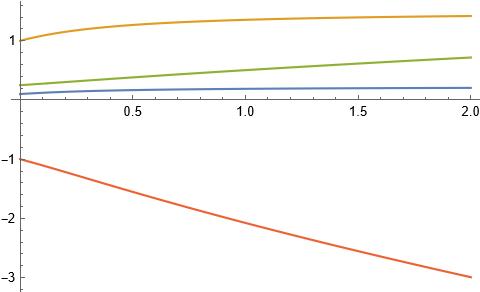I am trying to solve a coupled system of second order differential equations using either DSolve[] or NDSolve[]. I believe Mathematica may not be powerful enough to find the solution because when I use the same syntax and simpler equations, it solves them correctly but when I run the full code below, it gives me my input back.
Here is my code:
SetAttributes[epsilon, {Constant, Protected}]
SetAttributes[alpha, {Constant, Protected}]
SetAttributes[beta, {Constant, Protected}]
eqns = {phi''[t] ==
-(3 (a[t]^2 a'[t] phi'[t] +
epsilon a[t]^2 a'[t] phi'[t] +
epsilon a[t]^2 Abs[alpha]^2 a'[t] phi'[t] +
epsilon Abs[alpha]^2 b[t]^2 b'[t] phi'[t]))/(a[t]^3 + epsilon a[t]^3 +
epsilon a[t]^3 Abs[alpha]^2 + epsilon Abs[alpha]^2 b[t]^3),
chi''[t] ==
-(3 (epsilon a[t]^2 Abs[beta]^2 a'[t] chi'[t] +
b[t]^2 b'[t] chi'[t] + epsilon b[t]^2 b'[t] chi'[t] +
epsilon Abs[beta]^2 b[t]^2 b'[t] chi'[t]))/(epsilon a[t]^3 Abs[beta]^2 +
b[t]^3 + epsilon b[t]^3 + epsilon Abs[beta]^2 b[t]^3),
a''[t] ==
1/(4 a[t]) (-2a'[t]^2 + epsilon a[t]^2 Abs[beta]^2 chi'[t]^2 +
a[t]^2 phi'[t]^2 + epsilon a[t]^2 phi'[t]^2 +
epsilon a[t]^2 Abs[alpha]^2 phi'[t]^2),
b''[t] ==
1/(4 b[t]) (-2 b'[t]^2 + b[t]^2 chi'[t]^2 +
epsilon b[t]^2 chi'[t]^2 + epsilon Abs[beta]^2 b[t]^2 chi'[t]^2 +
epsilon Abs[alpha]^2 b[t]^2 phi'[t]^2)};
sol = DSolve[eqns, {phi[t], chi[t], a[t], b[t]}, t]
I've also tried putting in initial conditions and get the same result. Is it possible Mathematica just can't handle a system this complicated? Is there anything I can do to make it work? Thanks!


NDSolveyou need initial conditions and numeric values for the parameters. ForDSolveit would not be surprising to me if a nonlinear, high-dimensional system cannot be solved symbolically (byDSolve). $\endgroup$